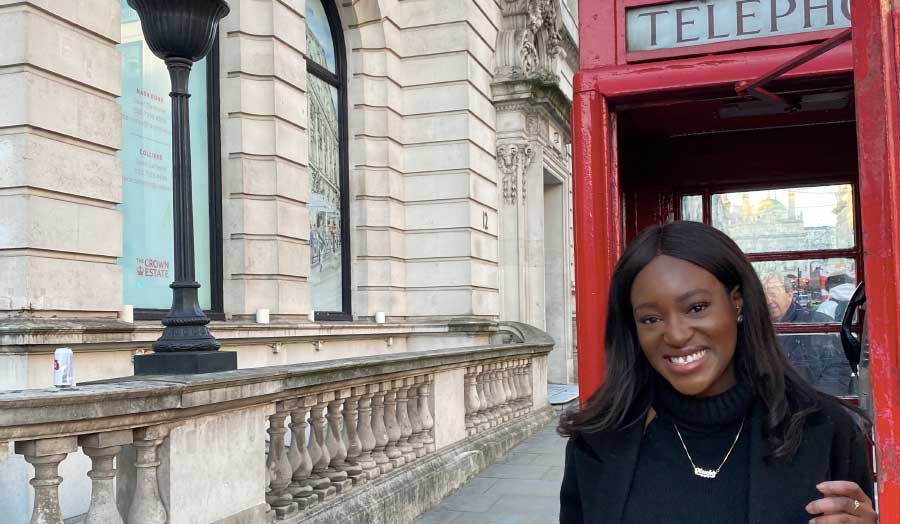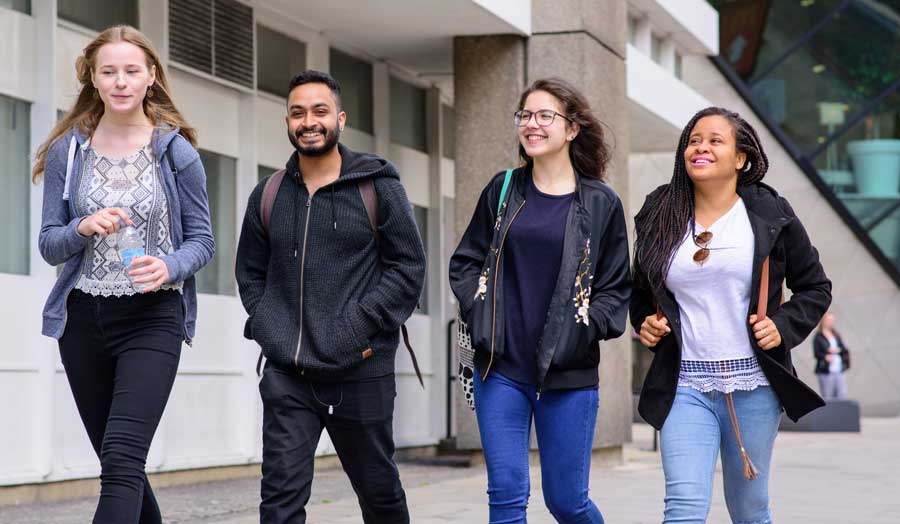Based in one of the world's most exciting capital cities, we're home to a diverse community of inspiring and determined learners, teachers and innovative thinkers, representing over 140 nationalities.
Accelerated and affordable
We offer three-year bachelor’s and one-year master's degrees, saving students time and money while allowing them to start earning sooner. Eligible USA applicants can benefit from scholarships worth £3,450 - £3,950.
There are no general education requirements, meaning students begin their chosen course from day one at a university ranked in the top 10 in the UK for teaching quality and student experience (Times Good University Guide 2024).
Get in touch
If you are a US student or a US institution interested in partnering with or attending London Met, we'd love to hear from you! Please contact our advisor:
Tara Murphy, Senior International Officer (North America)
Based in North America (Pacific time)
Email: international@londonmet.ac.uk
Telephone: +44 (0)20 7133 3317
Key information for students from the USA
Applying from the USA? See below for our entry requirements and check out our information for covering funding, support and contact details.
Please note: This information is provided as a guide only. Some courses may have specialised entry requirements that are listed on the relevant course page. Please check for any additional subject/course specific requirements before submitting your application.
If you have questions about how your qualifications from the USA translate, please contact international@londonmet.ac.uk
Academic entry requirements
Type of course |
Qualification/grade |
| Three-year undergraduate degree |
One of the following award qualifications:
Student applying with US high school qualifications must also submit one of the following (test-optional):
Transfer applicants: Students who have completed an associate’s degree at a community college or two years (60 credits) at a US university with a GPA of 2.7 in a relevant subject area may be considered for Advanced Entry to Year 2 (evaluated on a case-by-case basis). |
| Four-year degree including a foundation year |
Students who fall slightly below the standard requirements may be considered for an appropriate foundation year degree programme. One of the following award qualifications:
Student applying with US high school qualifications must also submit one of the following (test-optional):
|
| A US bachelor's degree with cumulative GPA of 2.7, with at least 30 credits from one specific subject area, and a relevant well written statement in support of the application that demonstrates the applicant’s suitability, interest and motivation. Test scores are not required. |
|
| International Programme and Pre-Master's Programme |
We offer for students who may require additional foundation coursework before applying for our bachelor’s and master’s courses. |
Mathematics and English requirements
Subject |
Qualification/grade |
| English |
We accept the following country-specific qualification(s):
We also accept all of these general English language requirements. |
| Mathematics (if applicable to your course) | A pass in senior year / Year 12 Mathematics from US high school (3.0 GPA). |
General FAQs
See our International FAQs page for questions regarding visas, funding, applying, studying and living in the UK and London Metropolitan University.
US specifc FAQs
I will be visiting the UK, can I arrange a campus tour?
Please check our events page to see if your visit coincides with pre-planned events. If there is no available event please request a campus tour. Please be aware that the UK government has announced a plan to roll out Electronic Travel Authorisation (ETAs) from 2024, requiring travellers to apply online prior to travel, including US citizens. US nationals travelling to the UK on or after 8 January 2025 will require an ETA. Applications open from 27 November 2024. Please check the government website before travelling.
My family wants to visit me in London, do they need a visa?
This depends on their passport, length of stay and plans while travelling. They can use the UK government website to check if and what visa they need. The UK government has announced a plan to roll out Electronic Travel Authorisation (ETAs) from 2024, requiring travellers to apply online prior to travel, including US citizens. US nationals travelling to the UK on or after 8 January 2025 will require an ETA. Applications open from 27 November 2024. Please check the government website before travelling.
How can I fund my studies at London Met?
You can fund your studies through personal savings, family contributions, educational loans, US federal loans, scholarships and part-time work. London Met’s school code on FASFA is G22353. Find out more about US financial aid including veteran benefits. We also offer a range of scholarships for students from the US including USA Global Horizon, International Bright Futures and International Student House.
Do I need to pay a deposit?
US students who are fully funding their studies via US financial aid are typically exempt from paying a deposit. For students who are self-funding they usually have to pay a deposit equal to 50% of the tuition fees for the first year. This must be paid before CAS can be assigned.
Do I need to pay taxes as a student in the UK?
As a student, you're typically exempt from paying council tax (like a property tax), however, if you live with non-students this may be required. You should request a Council tax exemption letter from your school office and then give it to your local council office. If you work part-time, you may need to pay income tax and national insurance if your earnings exceed the personal allowance threshold. Also, VAT (value-added tax, equivalent to sales tax) is typically included in the price of most goods and services. Finally, if you have a television in your home or watch online programming such as BBC iPlayer you may need to purchase a TV License.
If you are earning an income you may be required to pay income tax if your earn above the personal income tax allowance. You can find more information here under "Do I need to pay income tax".
Can London Met complete US 1098-T tax forms?
The university does not have an EIN or issue the 1098-T tax form as an overseas instituion. However, you can independently download/ request the information you need to file your US taxes. See our US Financial Aid FAQs for more information.
Do I need to take an English Language test?
Applicants from the USA who are US citizens are usually exempt from submitting English language requirements. SELT requirements apply to applicants that are not of majority English speaking nationality as defined by the UK Home Office, or those who do not possess a degree awarded, studied and conferred in a majority English speaking country. Find out more information on English language requirements and exemptions.
Can I transfer credits from my US institution to London Met?
As the English education style doesn’t include general education classes, transferring credits isn’t common. College classes may be considered as part of our entry requirements or if you have completed a two-year associate degree you may be considered for Year 2 entry on a case-by-case basis.
How do I choose my modules at London Met?
Modules (classes) are either core (required) or optional (select a certain number to complete). Most undergraduate courses have all core modules in the first year with more optional throughout the second and third year. For postgraduate it also depends on the course how many core or optional modules you will have. Typically, your timetable is designed for you with information provided once you arrive in the UK for orientation, and therefore you do not need to sign up to classes before arriving. If this is different your department will contact you with the relevant information to select your modules. You can see what modules are available for your course on the course page.
Are there any specific items I can't bring into the UK?
Certain items are restricted or prohibited from being brought into the UK, such as controlled drugs, firearms, weapons and certain food products. Check the UK government website for a full list. Please be aware that self-defence weapons such as bear/pepper spray are illegal in the UK. It is also advised to check all medicine before travelling.
Will my US mobile phone work in the UK?
This depends on your phone and your carrier. It's best to check with your provider; you may need to unlock your phone before traveling. We typically recommend students get a UK SIM card for local and cheaper rates. These can be purchased at the airport, online or at several high street (main street) retailers.
What laws in the UK are different that I should be aware of?
The legal drinking age is 18, driving is on the left side of the road, and there are strict anti-weapon laws (pepper spray is illegal) in addition to strict smoking and drug laws. It's also important to familiarise yourself with the UK's laws on acceptable behaviour, hate speech and drug use, as they may differ from US laws.
What are the biggest cultural differences I might experience in London?
While the US and UK share a common language and many cultural elements, you'll likely encounter distinct differences in London, such as the importance placed on politeness, queuing and a less widespread tipping culture. The British approach to humour, language nuances and day-to-day interactions may also differ from those in the US.
What's the difference between 'college' and 'university' in the UK compared to the US?
In the US, 'college' and 'university' can be used interchangeably. However, in the UK, 'college' typically refers to institutions that offer further education courses, while 'university' refers to institutions that offer undergraduate and postgraduate degrees.
What language differences should I be aware of between American and British English?
Be prepared for different spellings, vocabulary and idiomatic expressions. For example, 'apartment' is 'flat', 'elevator' is 'lift', and 'college' can mean a different type of institution. Key spelling differences include the use of ‘s’ instead of ‘z’ in words like realise, specialise, and summarise.
The date format within the UK is different to the US with the UK using the Day / Month / Year format. It is also common for the UK to use the 24-hour clock format e.g., 18:00 instead of 6pm. Finally, the UK using a mix of metric and imperial measurements eg, temperature is measured in Celsius whereas the road speed limit is in miles.
We have a local representative based in British Columbia, Canada, who travels to school and college fairs, large fairs (eg. NACAC) and conferences. We are happy to visit high schools and partner institutions virtually and in-person. Please get in touch by emailing international@londonmet.ac.uk. In the meantime, you can check out our entry requirements and advice for students from the USA and Canada.
| Date | Location | Further information |
|---|---|---|
| Ongoing | Online | Book a virtual 121 |
| Ongoing | London, UK | Book an international campus tour |
| Ongoing | London, UK | Book an international counsellor campus tour |
| 17 Sept 2024 | New York City, New York | BASIS independent manhattan visit |
| 17 Sept 2024 | New York City, New York | CIS international university fair |
| 18 Sept 2024 | Atlanta, Georgia | CIS international university fair |
| 19 Sept 2024 | Nashville, Tennessee | Tennessee State Univeristy, Study abroad fair |
| 21 Sept 2024 | Toronto, Ontario | SIUK Toronto fair |
| 22 Sept 2024 | San Francisco, California | CIS international university fair |
| 24 Sept 2024 | Newport Beach, California | Pacifica Christian High School |
| 24 Sept 2024 | Vancouver, British Columbia | SIUK Vancouver fair |
| 25 Sept 2024 | LA, California | NACAC fair |
| 26 - 28 Sept 2024 | LA, California | NACAC Conference |
| 28 Oct 2024 | Auburn, Washington | Green River transfer fair |
| 30 Oct 2024 | Shoreline, Washington | Shoreline Community College transfer fair |
| 31 Oct 2024 | Lynnwood, Washington | Edmonds College transfer fair |
| 12 Nov 2024 | Miami, Florida | Miami Counselor lunch |
| 12 Nov 2024 | Miami, Florida | Miami International University Fair |
| 13 Nov 2024 | Boca Raton, Florida | Boca Raton Counselor lunch |
| 13 Nov 2024 | Boca Raton, Florida | Boca Raton International University Fair |
| 14 Nov 2024 | Orlando, Florida | Orlando Counselor lunch |
| 14 Nov 2024 | Orlando, Florida | Orlando International University Fair |
| 15 Nov 2024 | Tampa, Florida | Tampa Counselor lunch |
If you are unable to attend an event but a representative will be in your area, please contact international@londonmet.ac.uk to arrange a separate meeting (depending on availability)
This guide is designed to help you navigate through the various differences in terminology between the United States and the United Kingdom. While we've provided close equivalents where possible, it's important to note that these terms, especially those related to governance and official entities, may not have exact counterparts. Each country's unique administrative and cultural context means that a direct comparison might not always align precisely. We encourage you to use this guide as a starting point and conduct further research if you need specific and detailed information.
Academic terms
US term |
UK equivalent |
| College | University |
| Elementary | Primary School |
| Dormitory | Halls of residence |
| Faculty (As in a Division) | School or department |
| Freshman | First year |
| Grade | Mark |
| Grade Point Average (GPA) | Degree classification |
| High School | Secondary School |
| Junior | Third year |
| Major | Degree course |
| Minor | Elective module – some courses may also offer 'joint honours' where you can combine subject areas |
| Public School | State school |
| Sophomore | Second year |
| University President | Vice-Chancellor |
General
US term |
UK equivalent |
| Apartment | Flat |
| Cell phone | Mobile |
| Cilantro | Coriander |
| Chips | Crisps |
| Costume | Fancy dress |
| Eggplant | Aubergine |
| Elevator | Lift |
| Fall | Autumn |
| First floor | Ground floor |
| Lawyer | Solicitor/barrister – Legal professionals; 'solicitors' generally handle legal advice and 'barristers' represent clients in court. |
| Paid time off | Annual leave / sick leave |
| Public holiday | Bank holiday |
| Realtor | Estate agent |
| Resume | CV (curriculum vitae) |
| Round trip ticket | Return ticket |
| Semester | Term |
| Soccer | Football |
| Social Security Number (SSN) | National Insurance Number (NIN) |
| Subway | Underground/tube |
| Zip code | Postcode |
| Zucchini | Courgette |
Please find below a list of key terms around UK higher education. We have also created a document with key terms you can download and save.
UCAS
Key term |
Explanation |
|
Buzzword |
A unique word provided by a school (if they are registered as a UCAS centre) that acts as a key identifier, linking a student's undergraduate application with the school. This allows them to track the application and upload references and relevant information. |
|
Clearing |
A UCAS process that allows students to find and apply for university courses that still have vacancies, typically after the main application period. Whilst the date that UK universities open for Clearing varies, many will have it available on A-Level results day (typically the second Thursday in August). While Clearing is open to all students, it particularly supports those who did not receive the grades they needed for their conditional offer or those who exceeded their conditions. It varies as to whether universities allow international students to apply via Clearing due to the short time between Clearing opening and term starting, meaning visas can be difficult to acquire. |
|
Conditional Offer |
An offer of a place at a university that is dependent on the applicant meeting specific conditions, often related to exam results or other qualifications. |
|
Firm Choice |
In the UCAS application process, the firm choice is the student's preferred and first choice university. |
|
Insurance Choice |
In the UCAS application process, the insurance choice and second choice serves as a backup in case the firm choice is not secured, for example, by not meeting the academic conditions. |
|
Oxbridge |
A colloquial term combining "Oxford" and "Cambridge," referring to the University of Oxford and the University of Cambridge in the UK. You can only apply to one of these universities per year on your UCAS application. |
|
Personal Statement |
A written document submitted with a university application (like a college application essay), in which the student details what course they want to study, why they want to study it and what makes them a good candidate for that course. |
|
Tariff Points |
A numerical system assigned to different qualifications and grades provides a standardised way for universities to assess and compare applicants' academic achievements. |
|
Teacher Reference |
A written recommendation provided by a teacher or advisor as part of the UCAS application. Recent changes to the teachers' reference have created three separate sections covering general information about a school, extenuating circumstances and supportive information about the applicant that is relevant to the course. |
|
UCAS |
The Universities and Colleges Admissions Service, a central application service for students applying to higher education institutions in the UK. |
|
UCAS Centre |
A UCAS centre is an educational institution or organisation registered with UCAS, allowing students to make their application through that institution. It is free for a school to become a centre with more information provided on the UCAS website. |
|
UCAS Extra |
A UCAS service allowing students who have used all five choices and haven't received any offers to apply for additional courses one at a time. |
|
UCAS Track |
An online system that allows applicants to track the progress of their UCAS application, including offers, replies, and the status of chosen universities. |
|
Unconditional Offer |
An offer of a place at a university without any specified conditions, indicating that the applicant has already met the necessary requirements. |
For additional information on UCAS key terms and abbreviations please see their website.
Qualifications
Key term |
Explanation |
|
2:1 (Upper Second) |
Denotes a specific classification of an undergraduate degree, typically awarded for achieving a mark between 60% and 69%. |
|
2:2 (Lower Second) |
Represents another classification of an undergraduate degree, indicating a performance within the range of 50% to 59%. |
|
Adv Dip Pro Dev |
Advanced Diploma in Professional Development, a program designed to enhance professional skills and knowledge beyond the undergraduate level. |
|
A-Levels |
Advanced Level qualifications usually taken by students aged 16-18. They are subject-specific and widely used for university admissions in the UK. |
|
BA |
Bachelor of Arts, an undergraduate academic degree typically awarded in the arts, humanities, or social sciences. |
|
BEng |
Bachelor of Engineering, an undergraduate academic degree awarded in the field of engineering. |
|
BSc |
Bachelor of Science, an undergraduate academic degree typically awarded in the natural sciences, mathematics, or related disciplines. |
|
BSocSci |
Bachelor of Social Science, an undergraduate academic degree in social sciences, encompassing disciplines like sociology and anthropology. |
|
BTECs |
Business and Technology Education Council qualifications, offering a more vocational and practical approach than A-Levels usually taken by students aged 16-18. |
|
DBA |
Doctor of Business Administration, a doctoral-level academic degree emphasising practical application of business knowledge and research. |
|
First |
Refers to the highest classification of an undergraduate degree, indicating outstanding academic achievement and typically a mark of 70% or above. |
|
GCSEs |
General Certificate of Secondary Education, taken by students aged 14-16. GCSEs cover a range of subjects and are crucial for further education and employment. |
|
GDL |
Graduate Diploma in Law, a conversion course for individuals with a non-law degree seeking to qualify as solicitors or barristers. |
|
Honours Degree (Hons) |
Honours, denoting an undergraduate degree program focused on specialisation and typically awarded to students with higher academic achievements. |
|
LLB |
Bachelor of Law, an undergraduate academic degree in law. |
|
LLM |
Master of Laws, a postgraduate academic degree in law, often pursued for advanced specialisation in legal studies. |
|
MA |
Master of Arts, a postgraduate academic degree that follows a bachelor's degree and often involves advanced study in the arts or humanities. |
|
MArch |
Master of Architecture is a postgraduate academic degree for individuals pursuing advanced studies and architectural qualifications. |
|
MBA |
Master of Business Administration, a postgraduate academic degree focusing on business and management principles. |
|
MFA |
Master of Fine Arts, a postgraduate academic degree focused on creative and visual arts, including areas such as painting, sculpture, and writing. |
|
MPhil |
Master of Philosophy, a postgraduate academic degree that often involves a combination of coursework and research. |
|
MSc |
Master of Science, a postgraduate academic degree awarded in various scientific and technical fields. |
|
PG Cert |
Postgraduate Certificate, a short program providing specialised knowledge and skills, often completed in less time than a full master's degree. |
|
PG Dip |
Postgraduate Diploma, a more extensive program than a certificate, offering in-depth study and often serving as a pathway to a master's degree. |
|
PhD |
Doctor of Philosophy, the highest academic degree awarded in various fields, requires original research and a doctoral thesis submission. |
|
Prof Doc |
Professional Doctorate is a doctoral-level qualification focused on applying research to professional practice in various fields. |
|
QTS |
Qualified Teacher Status is a professional accreditation in the UK allowing individuals to teach in state-maintained schools. |
|
Third |
The classification below 2:2, indicates a pass but with lower overall academic performance typically awarded for achieving a mark between 40% and 49%. |
|
T-Levels |
A vocational qualification introduced in the UK, focusing on technical skills and practical experience in a specific industry. |
To see what type of qualification your London Metropolitan University degree holds, please see our course finder.
General higher education
Key term |
Explanation |
|
Alumni association |
An organisation connecting former students (alumni) with their former university, fostering networking, mentorship, and support opportunities. |
|
Bursary |
Financial aid provided to students based on financial need. Bursaries can assist with tuition fees, living expenses, or other educational costs. Bursaries within the UK are typically for domestic students; however, international students may be able to access other financial aid through scholarships and grants. |
|
Campus university |
A way to refer to the style and location of a UK university that offers distinct environments for student life. A campus university has a more self-contained campus setting and may be based in a more suburban area or away from the inner city. |
|
Career services |
University-provided resources and support to help students explore career options, develop job-search skills, and transition into the workforce after graduation. Careers services can often help students look for part-time work during their studies and work placements. |
|
City university |
A way to refer to the style and location of a UK university that offers distinct environments for student life. A city university is located within an urban area, possibly with multiple locations. |
|
Core modules |
Core modules are mandatory components of a program. As a generalisation, within the UK, undergraduate courses start with more core modules, and as the student progresses through the years, more optional modules become available to them. London Metropolitan University includes a list of our course's core and optional modules on the individual course pages. |
|
Course rep/representative |
A student elected or appointed to represent the views and concerns of their peers to academic staff and university management. |
|
Course syllabus |
An outline of the topics, readings, and assessments covered in an academic course. The syllabus provides a roadmap for students throughout the academic year. |
|
Coursework |
Assignments, projects, or tasks that students complete as part of their course assessment. |
|
Dissertation |
An extended piece of academic writing involving in-depth research on a specific topic. Within the UK, it is common for undergraduate students to complete a dissertation within their final year. It is typically required for postgraduate study, |
|
Distance learning |
A mode of study where students engage in courses remotely, often online, without attending physical classes on campus. |
|
Enrolment |
The process of officially registering for courses and becoming a student at a university for a specific academic term. Within the UK, students do not typically have to sign up for modules before their arrival. However, this varies between institutions. |
|
Examination period |
The specific time frame during which formal exams take place, usually at the end of a term or academic year. Within the UK, these typically take place in December or January and/or May or June for undergraduate students. |
|
Foundation year |
An additional preparatory year before the start of a degree program, designed to provide essential knowledge and skills to students who may need extra support. |
|
Freshers' week/welcome week |
The initial week of the academic year features orientation activities, social events, and introductions to university life. |
|
Gap year |
A break typically taken by students between finishing high school and starting university, often spent traveling, working, or engaging in volunteer activities. |
|
Halls of residence |
Another term for student dormitories. Halls of residence, commonly referred to as ‘halls’, offer various room options and communal facilities, fostering a sense of community among residents. These can be owned by the university or private companies. Within the UK, it is typical for students to have a private bedroom with options for personal bathrooms (ensuite). Halls can be catered (food provided like a meal plan) or self-catered (kitchen provided to complete your own cooking). |
|
International orientation |
A period, often just before the start of the academic term, where international students are invited to campus for sessions covering information relevant to them such as visa compliance, setting up bank accounts, UK laws and more. Not all institutions will provide this however London Metropolitan University does. |
|
Internship/placement |
A period of work experience related to a student's field of study, providing practical skills and insights into the industry. |
|
Lecture |
A formal, instructor-led presentation or talk on a specific subject, usually delivered to a large group of students. |
|
Library resources |
Various materials and services are available to students in a university library, including books, journals, electronic databases and study spaces. |
|
Module |
A self-contained unit of study within a course, often with its own set of learning objectives, assessment methods, and academic credit value. In other countries, this is referred to as a 'class'. |
|
Module handbook |
A document outlining details of a specific academic module, including objectives, assessment methods, reading lists, and other relevant information. |
|
Open day |
An event hosted by universities to showcase their campus, facilities, and academic programs, allowing prospective students to explore and gather information. You can see all upcoming London Metropolitan University open days and campus tours on our events page. |
|
Optional modules |
Another term for an elective. Optional modules allow students to choose which classes they would like to attend. These are often still within their subject area but allow students to select where they would like to specialise. The students are often told how many optional modules they can take per year. As a generalisation, within the UK, undergraduate courses start with more core modules, and as students progress through the years, more optional modules become available to them. London Metropolitan University includes a list of our course's core and optional modules on the individual course pages. |
|
Personal tutor |
An assigned academic staff member who provides guidance, support, and advice to students throughout their academic journey. |
|
Plagiarism |
The act of presenting someone else's work, ideas, or intellectual property as one's own without proper acknowledgement considered academic misconduct. This extends to the personal statement within the application. |
|
Postgraduate |
Education pursued after the completion of an undergraduate degree. Includes master's degrees, PhDs, and other advanced qualifications. |
|
Reading week |
A designated week during the term when students are encouraged to focus on independent study, catch up on reading, and prepare for upcoming assessments. |
|
Resit/retake |
The opportunity for a student to retake an exam or assessment after an initial attempt, often due to a suboptimal performance. Often marks for resits are capped at a pass rate; however, this depends on the course and institution. |
|
Sandwich/ placement year |
A year within an undergraduate degree where students undertake work placements or study abroad to gain practical experience in their field, often between Year 2 and 3. |
|
Scholarship |
An award granted to students based on academic merit, talent, or other criteria. Scholarships may cover tuition fees, living expenses, or both. You can review London Metropolitan University’s scholarships on our funding pages. |
|
Semester |
A division of the academic year, usually consisting of two terms. Within the UK, universities typically use a three-term or two-semester system. London Metropolitan University uses the three-term system. |
|
Seminar |
A collaborative and interactive session where students engage in discussions, debates, and group activities related to the course material often led by a lecturer or facilitator. |
|
Student Loan |
Financial assistance provided to students for tuition fees and living expenses, often offered by government or private institutions. Domestic students use funding such as Student Finance England whereas international students may be able to access this from their home countries such as US federal loans. |
|
Student society/club |
An organisation run by and for students, focusing on shared interests, hobbies, or activities. Societies provide opportunities for socialisation and personal development. |
|
Student support services |
Resources and services provided by universities to assist students with academic, personal, or emotional challenges. London Metropolitan University offers services such as counselling, disability and dyslexia, careers and more. We also have a dedicated international and adviceteam. |
|
Students' Union |
An organisation representing students within a university, providing services, support, and organising social and recreational activities. |
|
Term |
A specific period of the academic year, typically divided into three terms (autumn, spring, and summer). Within the UK, universities typically use a three-term or two-semester system. London Metropolitan University uses the three-term system. |
|
Transcript |
A record of a student's academic performance detailing courses taken, grades received, and other relevant information. |
|
Tutorial |
A small-group session, often led by a tutor, focusing on discussion, clarification of course material, and addressing students' questions. |
|
Undergraduate |
Refers to the level of education that comes before a student earns their first degree. Undergraduate programs typically include bachelor's degrees. |
For additional London Metropolitan University specific terms please see our glossary.
Search for all courses
Our international team
We offer a welcoming and supportive environment situated in one of the world’s greatest cities. Our international students come from all over the world, giving you the opportunity to meet people from a variety of different backgrounds. No matter where you're from, we'll ensure you have the best possible university experience and, if you need support during your time with us, our international advisers can provide valuable information and advice.
Living in London is a fantastic experience as a student – with so many places to explore, things to do and people to meet. Whether it's working in the UK, the cost of living or how to register with a doctor, we understand that as an international student you may have some questions and concerns about moving to London – we hope that the information below will help answer your questions.









.jpg)
.jpg)



-(1).jpg)

.png)
-(1).png)
.jpg)
.jpg)
